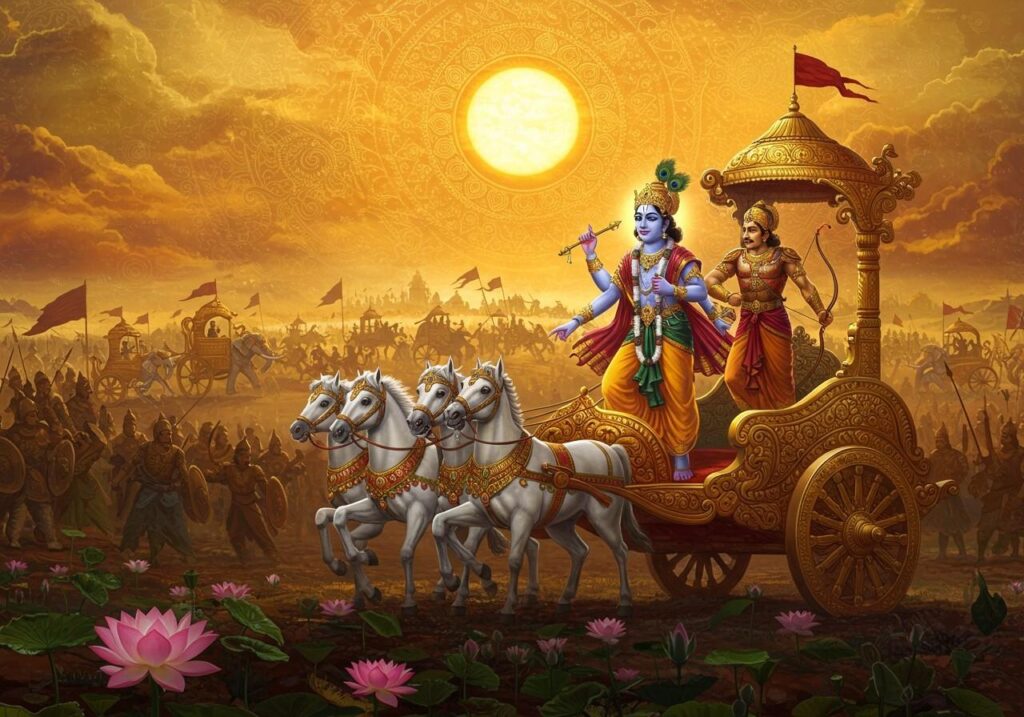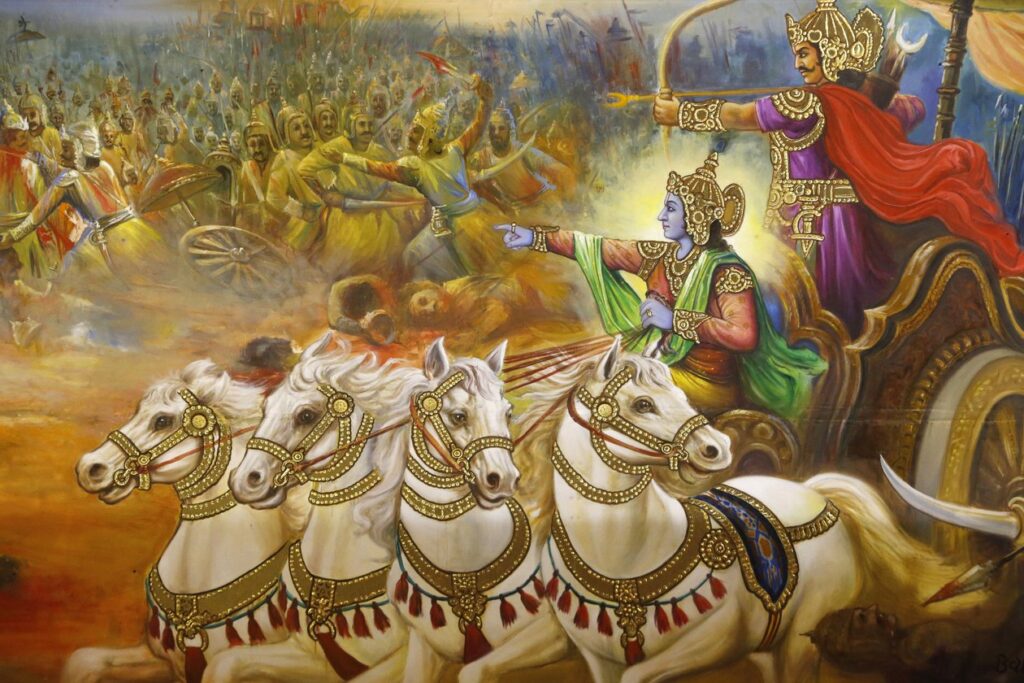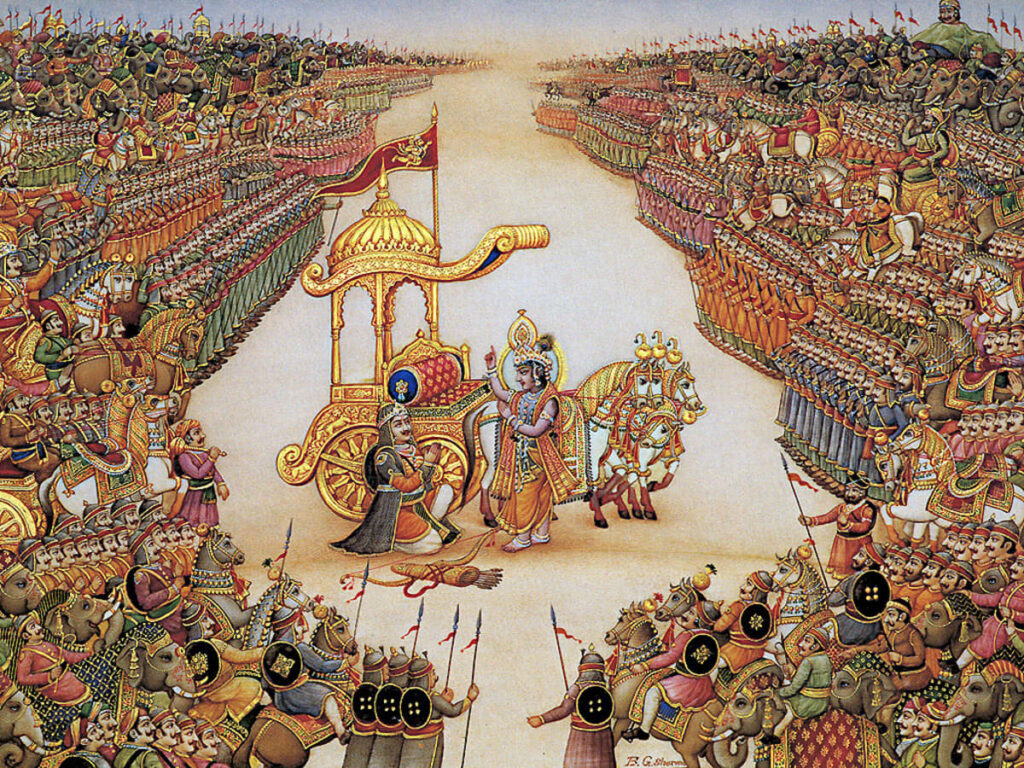On August 16, 2025, the world celebrated Krishna Janmashtami, marking the 5252nd birth anniversary of Lord Krishna, the eighth avatar of Lord Vishnu. This sacred Hindu festival, also known as Gokulashtami, honors Krishna’s divine birth in Mathura, symbolizing the triumph of good over evil, love, and righteousness. As devotees engage in midnight puja, Dahi Handi, and Rasleela, Krishna’s timeless wisdom from the Bhagavad Gita and Mahabharata offers profound guidance for business leaders navigating today’s dynamic corporate landscape.
YTC Ventures (www.ytcventures.com) invites investors and B2B customers to channel Krishna’s strategic and ethical insights into India’s booming startup ecosystem, particularly in Tier 2 cities like Jaipur and Kochi. Join us in celebrating Krishna’s legacy while shaping the future of innovation.
The Divine Birth of Lord Krishna: A Beacon of Dharma
Born to Devaki and Vasudeva in a Mathura prison under King Kansa’s tyranny, Krishna’s birth was a divine act to restore dharma. Escaping Kansa’s wrath, Vasudeva carried infant Krishna across the Yamuna River to Vrindavan, where Yashoda and Nanda raised him as their own. From his playful days as “Makhan Chor” to defeating demons like Pootana and Kaliya Naag, Krishna’s life embodies joy, courage, and compassion. On August 16, 2025, over three million devotees are expected to throng Mathura and Vrindavan, adorning temples with flowers, swings, and lights for “Baal Gopal” during the sacred Nishita Kaal puja (12:04 AM–12:47 AM).

Janmashtami 2025: Rituals and Global Celebrations
Krishna Janmashtami unites devotees through vibrant rituals:
- Midnight Puja: Performed during Nishita Kaal, devotees chant “Om Namo Bhagavate Vasudevaye” and recite the Bhagavad Gita.
- Dahi Handi: In Maharashtra, teams form human pyramids to break curd-filled pots, echoing Krishna’s butter-stealing antics.
- Rasleela and Kirtan: Vrindavan and Manipur host dance-dramas depicting Krishna’s divine love with Radha.
- Parades: In Nepal’s Bhaktapur, oil lamps and flute melodies mark festive processions.
These traditions, rooted in the Bhagavata Purana and Gita Govinda, reflect Krishna’s universal appeal as a divine guide.
Krishna’s Teachings: A Blueprint for Modern Leadership
Krishna’s counsel to Arjuna in the Bhagavad Gita during the Kurukshetra war offers timeless lessons for business leaders. His emphasis on Karma Yoga (selfless action), Gyan Yoga (knowledge), and Bhakti Yoga (devotion) provides a framework for ethical and strategic decision-making. As
@ROUBLENAGI posted on X, “His message in the Bhagavad Gita reminds us that in times of uncertainty, faith, courage, & righteous action always light the way.” Krishna’s defeat of Kaliya Naag symbolizes overcoming ego, while his friendship with Sudama teaches humility—values that inspire entrepreneurs to lead with purpose and resilience.

100 Timeless Tips from Lord Krishna for Business Leaders
Duty and Purpose (Karma Yoga)
- Perform duties without attachment to outcomes.
Gita 2:48: योगस्थः कुरु कर्माणि सङ्गं त्यक्त्वा धनञ्जय। सिद्ध्यसिद्ध्योः समो भूत्वा समत्वं योग उच्यते।
(Establish yourself in yoga, perform actions without attachment, treating success and failure equally.) - Act selflessly for the greater good.
Gita 3:20: कर्मणैव हि संसिद्धिमास्थिता जनकादयः। लोकसङ्ग्रहमेवापि सम्पश्यन्कर्तुमर्हसि।
(Kings like Janaka attained perfection through selfless action, acting for the world’s welfare.) - Lead by example to inspire others.
Gita 3:21: यद्यदाचरति श्रेष्ठस्तत्तदेवेतरो जनः। स यत्प्रमाणं कुरुते लोकस्तदनुवर्तति।
(Whatever a great person does, others follow; their actions set a standard for the world.) - Never abandon duty due to difficulty.
Gita 18:7: दुःखमित्येव यत्कर्म कायक्लेशभयात्त्यजेत्। स कृत्वा राजसं त्यागं नैव त्यागफलं लभेत्।
(Abandoning duty out of fear of difficulty is ignorance and yields no spiritual benefit.) - Align actions with a higher purpose.
Gita 3:25: सक्ताः कर्मण्यविद्वांसो यथा कुर्वन्ति भारत। कुर्याद्विद्वांस्तथासक्तश्चिकीर्षुर्लोकसङ्ग्रहम्।
(The wise act without attachment to inspire the world, unlike the ignorant who act with desire.) - Work diligently, as inaction is not an option.
Gita 3:5: न हि कश्चित्क्षणमपि जातु तिष्ठत्यकर्मकृत्। कार्यते ह्यवशः कर्म सर्वः प्रकृतिजैर्गुणैः।
(No one can remain inactive even for a moment; all are compelled to act by nature’s qualities.) - Embrace selfless service to build trust.
Gita 3:22: न मे पार्थास्ति कर्तव्यं त्रिषु लोकेषु किञ्चन। नानवाप्तमवाप्तव्यं वर्त एव च कर्मणि।
(Krishna acts without need, setting an example of selfless duty for others.) - Focus on the present task, not future rewards.
Gita 2:47: कर्मण्येवाधिकारस्ते मा फलेषु कदाचन। मा कर्मफलहेतुर्भूर्मा ते सङ्गोऽस्त्वकर्मणि।
(You have a right to action, not its fruits; don’t be motivated by results or attached to inaction.) - Act with conviction in challenging times.
Gita 4:40: अज्ञश्चाश्रद्दधानश्च संशयात्मा विनश्यति। नायं लोकोऽस्ति न परो न सुखं संशयात्मनः।
(The ignorant and doubtful perish; conviction leads to success in this world and beyond.) - Prioritize societal impact over personal gain.
Gita 3:19: तस्मादसक्तः सततं कार्यं कर्म समाचर। असक्तो ह्याचरन्कर्म परमाप्नोति पूरुषः।
(Perform obligatory actions without attachment to attain the highest good.)

Resilience and Adaptability
- Face adversity with unwavering courage.
Gita 2:14: मात्रास्पर्शास्तु कौन्तेय शीतोष्णसुखदुःखदाः। आगमापायिनोऽनित्यास्तांस्तितिक्षस्व भारत।
(Pleasures and pains are transient; endure them with courage, O Arjuna.) - Adapt to changing circumstances.
Mahabharata (Krishna’s shift from Vrindavan to Dwarka, no specific verse).
(Adapt like Krishna, who navigated diverse roles as a leader and strategist.) - Overcome fear of failure.
Gita 2:3: क्लैब्यं मा स्म गमः पार्थ नैतत्त्वय्युपपद्यति। क्षुद्रं हृदयदौर्बल्यं त्यक्त्वोत्तिष्ठ परन्तप।
(Do not yield to weakness, Arjuna; rise above fear and stand firm.) - Stay resilient during setbacks.
Gita 6:16: नात्यश्नतस्तु योगोऽस्ति न चैकान्तमनश्नतः। न चातिस्वप्नशीलस्य जाग्रतो नैव चार्जुन।
(Balance in all things fosters resilience, neither overindulging nor abstaining excessively.) - Embrace challenges as opportunities.
Gita 18:78: यत्र योगेश्वरः कृष्णो यत्र पार्थो धनुर्धरः। तत्र श्रीर्विजयो भूतिर्ध्रुवा नीतिर्मतिर्मम।
(Where Krishna and Arjuna are, there is victory and prosperity.) - Maintain balance in success and failure.
Gita 2:48: योगस्थः कुरु कर्माणि सङ्गं त्यक्त्वा धनञ्जय। सिद्ध्यसिद्ध्योः समो भूत्वा समत्वं योग उच्यते।
(Act with equanimity, treating success and failure alike.) - Learn from setbacks to grow stronger.
Gita 2:50: बुद्धियुक्तो जहातीह उभे सुकृतदुष्कृते। तस्माद्योगाय युज्यस्व योगः कर्मसु कौशलम्।
(A wise person discards good and bad deeds through yoga; skill in action is yoga.) - Persist through uncertainty.
Gita 4:18: कर्मण्यकर्म यः पश्येदकर्मणि च कर्म यः। स बुद्धिमान्मनुष्येषु स युक्तः कृत्स्नकर्मकृत्।
(See inaction in action and action in inaction; persist wisely in uncertainty.) - Cultivate mental strength for leadership.
Gita 2:55: प्रजहाति यदा कामान्सर्वान्पार्थ मनोगतान्। आत्मन्येवात्मना तुष्टः स्थितप्रज्ञस्तदोच्यते।
(A leader with a steady mind, free from desires, is truly wise.) - Adjust strategies to meet new demands.
Mahabharata (Krishna’s diplomatic strategies, no specific verse).
(Adapt strategies like Krishna, who navigated complex alliances.)\

Ethical Decision-Making
- Act with integrity to uphold dharma.
Gita 4:7: यदा यदा हि धर्मस्य ग्लानिर्भवति भारत। अभ्युत्थानमधर्मस्य तदात्मानं सृजाम्यहम्।
(Whenever dharma declines, I manifest to restore righteousness.) - Balance ethics with pragmatic decisions.
Gita 4:8: परित्राणाय साधूनां विनाशाय च दुष्कृताम्। धर्मसंस्थापनार्थाय सम्भवामि युगे युगे।
(I appear to protect the virtuous and establish dharma.) - Avoid greed and ego in leadership.
Gita 16:3: तेजः क्षमा धृतिः शौचमद्रोहो नातिमानिता। भवन्ति सम्पदं दैवीमभिजातस्य भारत।
(Avoid arrogance and greed, traits of demonic nature.) - Make decisions aligned with core values.
Gita 3:35: श्रेयान्स्वधर्मो विगुणः परधर्मात्स्वनुष्ठितात्। स्वधर्मे निधनं श्रेयः परधर्मो भयावहः।
(Better to follow your own duty imperfectly than another’s perfectly.) - Prioritize long-term benefits over short-term gains.
Gita 2:45: त्रैगुण्यविषया वेदा निस्त्रैगुण्यो भवार्जुन। निर्द्वन्द्वो नित्यसत्त्वस्थो निर्योगक्षेम आत्मवान्।
(Rise above dualities and focus on lasting goals.) - Treat stakeholders with fairness.
Mahabharata (Krishna’s impartial counsel to Pandavas, no specific verse).
(Act justly with all stakeholders.) - Avoid deceit in business dealings.
Gita 16:10: काममाश्रित्य दुष्पूरं दम्भमानमदान्विताः। मोहाद्गृहीत्वासद्ग्राहान्प्रवर्तन्तेऽशुचिव्रताः।
(Avoid deceit, a trait of ignorance and impurity.) - Act with compassion toward all.
Mahabharata (Krishna’s kindness to Sudama, no specific verse).
(Lead with compassion, as Krishna showed.) - Uphold justice in leadership decisions.
Gita 4:7: यदा यदा हि धर्मस्य ग्लानिर्भवति भारत। अभ्युत्थानमधर्मस्य तदात्मानं सृजाम्यहम्।
(Restore justice when dharma falters.) - Align business goals with societal good.
Gita 3:20: कर्मणैव हि संसिद्धिमास्थिता जनकादयः। लोकसङ्ग्रहमेवापि सम्पश्यन्कर्तुमर्हसि।
(Act for the welfare of the world, as great leaders do.)

Knowledge and Self-Awareness (Gyan Yoga)
- Cultivate continuous learning.
Gita 2:50: बुद्धियुक्तो जहातीह उभे सुकृतदुष्कृते। तस्माद्योगाय युज्यस्व योगः कर्मसु कौशलम्।
(A wise person discards good and bad deeds through skillful action.) - Reflect on personal strengths and weaknesses.
Gita 13:8: अमानित्वमदम्भित्वमहिंसा क्षान्तिरार्जवम्। आचार्योपासनं शौचं स्थैर्यमात्मविनिग्रहः।
(Self-awareness includes humility, non-violence, and discipline.) - Seek wisdom from experienced mentors.
Gita 4:34: तद्विद्धि प्रणिपातेन परिप्रश्नेन सेवया। उपदेक्ष्यन्ति ते ज्ञानं ज्ञानिनस्तत्त्वदर्शिनः।
(Learn from the wise through humility and service.) - Understand market and industry dynamics.
Gita 2:55: प्रजहाति यदा कामान्सर्वान्पार्थ मनोगतान्। आत्मन्येवात्मना तुष्टः स्थितप्रज्ञस्तदोच्यते।
(A steady mind understands external realities clearly.) - Stay curious to drive innovation.
Gita 10:32: सर्वं विश्वेन संनादति यत्किञ्चित्सत्त्वं स्थावरजङ्गमं च। तत्सर्वं मम मायया संनादति।
(Krishna, the source of all, inspires curiosity and creation.) - Question assumptions to refine strategies.
Gita 4:40: अज्ञश्चाश्रद्दधानश्च संशयात्मा विनश्यति। नायं लोकोऽस्ति न परो न सुखं संशयात्मनः।
(The doubtful perish; question assumptions to gain clarity.) - Embrace self-discipline for focus.
Gita 6:16: नात्यश्नतस्तु योगोऽस्ति न चैकान्तमनश्नतः। न चातिस्वप्नशीलस्य जाग्रतो नैव चार्जुन।
(Discipline in moderation fosters focus.) - Learn from competitors’ strengths.
Mahabharata (Krishna’s observation of rivals, no specific verse).
(Study competitors to enhance strategies.) - Seek diverse perspectives for better decisions.
Gita 9:15: ज्ञानयज्ञेन चाप्यन्ये यजन्तो मामुपासते। एकत्वेन पृथक्त्वेन बहुधा विश्वतोमुखम्।
(Worship through knowledge, embracing diverse views.) - Apply knowledge practically to achieve goals.
Gita 3:8: नियतं कुरु कर्म त्वं कर्म ज्यायो ह्यकर्मणः। शरीरयात्रापि च ते न प्रसिद्ध्येदकर्मणः।
(Perform prescribed duties; action is superior to inaction.)

Emotional Intelligence and Team Unity
- Lead with empathy to inspire loyalty.
Gita 2:1: सञ्जय उवाच तं तथा कृपयाविष्टमश्रुपूर्णाकुलेक्षणम्। विषीदन्तमिदं वाक्यमुवाच मधुसूदनः।
(Krishna consoles a distressed Arjuna, showing empathy.) - Build trust through transparent communication.
Mahabharata (Krishna’s open counsel to Pandavas, no specific verse).
(Communicate openly to foster trust.) - Foster unity among diverse teams.
Gita 3:26: न बुद्धिभेदं जनयेदज्ञानां कर्मसङ्गिनाम्। जोषयेत्सर्वकर्माणि विद्वान्युक्तः समाचरन्।
(Do not disrupt the ignorant; unite through wise action.) - Listen actively to stakeholders’ needs.
Gita 4:34: तद्विद्धि प्रणिपातेन परिप्रश्नेन सेवया। उपदेक्ष्यन्ति ते ज्ञानं ज्ञानिनस्तत्त्वदर्शिनः।
(Learn by questioning and serving the wise.) - Manage conflicts with compassion.
Mahabharata (Krishna’s mediation in Kurukshetra, no specific verse).
(Resolve disputes with empathy and fairness.) - Inspire teams with a shared vision.
Gita 17:3: सत्त्वानुरूपा सर्वस्य श्रद्धा भवति भारत। श्रद्धामयोऽयं पुरुषो यो यच्छ्रद्धः स एव सः।
(A person is made by their faith; inspire with vision.) - Celebrate collective successes.
Mahabharata (Krishna’s support for Pandava victories, no specific verse).
(Acknowledge team achievements.) - Support employee growth and development.
Gita 2:50: बुद्धियुक्तो जहातीह उभे सुकृतदुष्कृते। तस्माद्योगाय युज्यस्व योगः कर्मसु कौशलम्।
(Skillful action supports growth and learning.) - Balance authority with humility.
Gita 16:3: तेजः क्षमा धृतिः शौचमद्रोहो नातिमानिता। भवन्ति सम्पदं दैवीमभिजातस्य भारत।
(Humility is a divine quality of leadership.) - Foster a positive and inclusive workplace.
Gita 3:21: यद्यदाचरति श्रेष्ठस्तत्तदेवेतरो जनः। स यत्प्रमाणं कुरुते लोकस्तदनुवर्तति।
(A leader’s actions shape a positive culture.)

Strategic Thinking and Innovation
- Plan strategically for long-term success.
Mahabharata (Krishna’s war strategies, no specific verse).
(Develop robust plans for enduring success.) - Anticipate market shifts proactively.
Gita 2:14: मात्रास्पर्शास्तु कौन्तेय शीतोष्णसुखदुःखदाः। आगमापायिनोऽनित्यास्तांस्तितिक्षस्व भारत।
(Endure transient changes with foresight.) - Innovate relentlessly to stay ahead.
Gita 10:32: सर्वं विश्वेन संनादति यत्किञ्चित्सत्त्वं स्थावरजङ्गमं च। तत्सर्वं मम मायया संनादति।
(Krishna inspires creation and innovation.) - Take calculated risks with confidence.
Gita 2:3: क्लैब्यं मा स्म गमः पार्थ नैतत्त्वय्युपपद्यति। क्षुद्रं हृदयदौर्बल्यं त्यक्त्वोत्तिष्ठ परन्तप।
(Rise above weakness and act boldly.) - Leverage alliances for growth.
Mahabharata (Krishna’s alliances with Pandavas, no specific verse).
(Build strategic partnerships.) - Stay agile in decision-making.
Gita 4:18: कर्मण्यकर्म यः पश्येदकर्मणि च कर्म यः। स बुद्धिमान्मनुष्येषु स युक्तः कृत्स्नकर्मकृत्।
(See action in inaction; act with agility.) - Focus on long-term strategic goals.
Gita 2:45: त्रैगुण्यविषया वेदा निस्त्रैगुण्यो भवार्जुन। निर्द्वन्द्वो नित्यसत्त्वस्थो निर्योगक्षेम आत्मवान्।
(Rise above dualities for long-term focus.) - Optimize resources for efficiency.
Gita 3:8: नियतं कुरु कर्म त्वं कर्म ज्यायो ह्यकर्मणः। शरीरयात्रापि च ते न प्रसिद्ध्येदकर्मणः।
(Action is superior; optimize resources.) - Embrace disruptive ideas for innovation.
Mahabharata (Krishna’s unconventional strategies, no specific verse).
(Pursue groundbreaking ideas.) - Monitor industry trends vigilantly.
Gita 2:50: बुद्धियुक्तो जहातीह उभे सुकृतदुष्कृते। तस्माद्योगाय युज्यस्व योगः कर्मसु कौशलम्।
(Skillful action requires trend awareness.)

Time Management and Discipline
- Prioritize tasks for maximum impact.
Gita 3:8: नियतं कुरु कर्म त्वं कर्म ज्यायो ह्यकर्मणः। शरीरयात्रापि च ते न प्रसिद्ध्येदकर्मणः।
(Perform prescribed duties for impact.) - Avoid procrastination to seize opportunities.
Gita 3:5: न हि कश्चित्क्षणमपि जातु तिष्ठत्यकर्मकृत्। कार्यते ह्यवशः कर्म सर्वः प्रकृतिजैर्गुणैः।
(Inaction is impossible; act promptly.) - Set clear deadlines for accountability.
Gita 2:48: योगस्थः कुरु कर्माणि सङ्गं त्यक्त्वा धनञ्जय। सिद्ध्यसिद्ध्योः समो भूत्वा समत्वं योग उच्यते।
(Act with discipline, unswayed by outcomes.) - Balance work with personal well-being.
Gita 6:16: नात्यश्नतस्तु योगोऽस्ति न चैकान्तमनश्नतः। न चातिस्वप्नशीलस्य जाग्रतो नैव चार्जुन।
(Moderation in work and rest fosters balance.) - Delegate tasks wisely to empower teams.
Mahabharata (Krishna’s guidance to Pandavas, no specific verse).
(Empower others through delegation.) - Plan daily goals aligned with vision.
Gita 3:21: यद्यदाचरति श्रेष्ठस्तत्तदेवेतरो जनः। स यत्प्रमाणं कुरुते लोकस्तदनुवर्तति।
(Leaders’ actions set daily priorities.) - Avoid distractions to maintain focus.
Gita 2:55: प्रजहाति यदा कामान्सर्वान्पार्थ मनोगतान्। आत्मन्येवात्मना तुष्टः स्थितप्रज्ञस्तदोच्यते।
(A steady mind avoids distractions.) - Review progress regularly to stay on track.
Gita 4:34: तद्विद्धि प्रणिपातेन परिप्रश्नेन सेवया। उपदेक्ष्यन्ति ते ज्ञानं ज्ञानिनस्तत्त्वदर्शिनः।
(Learn and review through inquiry.) - Optimize time allocation for efficiency.
Gita 3:20: कर्मणैव हि संसिद्धिमास्थिता जनकादयः। लोकसङ्ग्रहमेवापि सम्पश्यन्कर्तुमर्हसि।
(Act efficiently for the world’s welfare.) - Act decisively under time pressure.
Gita 2:3: क्लैब्यं मा स्म गमः पार्थ नैतत्त्वय्युपपद्यति। क्षुद्रं हृदयदौर्बल्यं त्यक्त्वोत्तिष्ठ परन्तप।
(Rise and act without hesitation.)

Customer-Centricity and Social Impact
- Prioritize customer needs above all.
Mahabharata (Krishna’s focus on people’s welfare, no specific verse).
(Place customers at the core of business.) - Build long-term customer relationships.
Gita 3:21: यद्यदाचरति श्रेष्ठस्तत्तदेवेतरो जनः। स यत्प्रमाणं कुरुते लोकस्तदनुवर्तति।
(Leaders’ actions foster lasting bonds.) - Solve real-world problems with purpose.
Gita 3:20: कर्मणैव हि संसिद्धिमास्थिता जनकादयः। लोकसङ्ग्रहमेवापि सम्पश्यन्कर्तुमर्हसि।
(Act for the world’s benefit.) - Deliver consistent value to clients.
Gita 2:48: योगस्थः कुरु कर्माणि सङ्गं त्यक्त्वा धनञ्जय। सिद्ध्यसिद्ध्योः समो भूत्वा समत्वं योग उच्यते।
(Act consistently, unswayed by outcomes.) - Listen to customer feedback for improvement.
Gita 4:34: तद्विद्धि प्रणिपातेन परिप्रश्नेन सेवया। उपदेक्ष्यन्ति ते ज्ञानं ज्ञानिनस्तत्त्वदर्शिनः।
(Learn from feedback through inquiry.) - Create inclusive solutions for diverse markets.
Mahabharata (Krishna’s universal appeal, no specific verse).
(Design solutions for all.) - Support community development initiatives.
Gita 3:25: सक्ताः कर्मण्यविद्वांसो यथा कुर्वन्ति भारत। कुर्याद्विद्वांस्तथासक्तश्चिकीर्षुर्लोकसङ्ग्रहम्।
(Act for societal upliftment.) - Build trust through reliable service.
Gita 3:21: यद्यदाचरति श्रेष्ठस्तत्तदेवेतरो जनः। स यत्प्रमाणं कुरुते लोकस्तदनुवर्तति।
(Reliability sets a standard.) - Address local needs with tailored offerings.
Mahabharata (Krishna’s localized guidance, no specific verse).
(Customize solutions for communities.) - Promote social good through business.
Gita 4:7: यदा यदा हि धर्मस्य ग्लानिर्भवति भारत। अभ्युत्थानमधर्मस्य तदात्मानं सृजाम्यहम्।
(Act to restore righteousness.)

Financial Prudence and Risk Management
- Manage finances with discipline.
Gita 2:45: त्रैगुण्यविषया वेदा निस्त्रैगुण्यो भवार्जुन। निर्द्वन्द्वो नित्यसत्त्वस्थो निर्योगक्षेम आत्मवान्।
(Rise above desires for disciplined finances.) - Avoid reckless spending or investments.
Gita 16:3: तेजः क्षमा धृतिः शौचमद्रोहो नातिमानिता। भवन्ति सम्पदं दैवीमभिजातस्य भारत।
(Avoid greed, a demonic trait.) - Assess risks thoroughly before acting.
Gita 2:14: मात्रास्पर्शास्तु कौन्तेय शीतोष्णसुखदुःखदाः। आगमापायिनोऽनित्यास्तांस्तितिक्षस्व भारत।
(Endure risks with careful assessment.) - Diversify revenue streams for stability.
Mahabharata (Krishna’s strategic alliances, no specific verse).
(Diversify for financial resilience.) - Plan for financial contingencies.
Gita 4:18: कर्मण्यकर्म यः पश्येदकर्मणि च कर्म यः। स बुद्धिमान्मनुष्येषु स युक्तः कृत्स्नकर्मकृत्।
(Wise action includes contingency planning.) - Invest in high-potential opportunities.
Gita 3:20: कर्मणैव हि संसिद्धिमास्थिता जनकादयः। लोकसङ्ग्रहमेवापि सम्पश्यन्कर्तुमर्हसि।
(Act for high-impact outcomes.) - Monitor cash flow diligently.
Gita 3:8: नियतं कुरु कर्म त्वं कर्म ज्यायो ह्यकर्मणः। शरीरयात्रापि च ते न प्रसिद्ध्येदकर्मणः।
(Action ensures financial stability.) - Avoid unsustainable debt.
Gita 16:10: काममाश्रित्य दुष्पूरं दम्भमानमदान्विताः। मोहाद्गृहीत्वासद्ग्राहान्प्रवर्तन्तेऽशुचिव्रताः।
(Avoid greed-driven debt.) - Seek sustainable financial growth.
Gita 2:48: योगस्थः कुरु कर्माणि सङ्गं त्यक्त्वा धनञ्जय। सिद्ध्यसिद्ध्योः समो भूत्वा समत्वं योग उच्यते।
(Act for balanced, sustainable growth.) - Balance risk and reward in decisions.
Gita 2:3: क्लैब्यं मा स्म गमः पार्थ नैतत्त्वय्युपपद्यति। क्षुद्रं हृदयदौर्बल्यं त्यक्त्वोत्तिष्ठ परन्तप।
(Act boldly but wisely.)

Mentorship and Networking
- Seek guidance from experienced mentors.
Gita 4:34: तद्विद्धि प्रणिपातेन परिप्रश्नेन सेवया। उपदेक्ष्यन्ति ते ज्ञानं ज्ञानिनस्तत्त्वदर्शिनः।
(Learn from the wise through service.) - Build strategic alliances for growth.
Mahabharata (Krishna’s alliances with Pandavas, no specific verse).
(Forge partnerships for success.) - Mentor young talent to foster innovation.
Gita 3:21: यद्यदाचरति श्रेष्ठस्तत्तदेवेतरो जनः। स यत्प्रमाणं कुरुते लोकस्तदनुवर्तति।
(Great leaders mentor others.) - Network with industry leaders.
Mahabharata (Krishna’s diplomatic connections, no specific verse).
(Build networks for growth.) - Share knowledge generously with teams.
Gita 4:34: तद्विद्धि प्रणिपातेन परिप्रश्नेन सेवया। उपदेक्ष्यन्ति ते ज्ञानं ज्ञानिनस्तत्त्वदर्शिनः।
(Share wisdom freely.) - Collaborate across sectors for synergy.
Gita 3:26: न बुद्धिभेदं जनयेदज्ञानां कर्मसङ्गिनाम्। जोषयेत्सर्वकर्माणि विद्वान्युक्तः समाचरन्।
(Unite through collaborative action.) - Build a supportive business ecosystem.
Mahabharata (Krishna’s role in uniting allies, no specific verse).
(Create a thriving ecosystem.) - Learn from peers to improve strategies.
Gita 2:50: बुद्धियुक्तो जहातीह उभे सुकृतदुष्कृते। तस्माद्योगाय युज्यस्व योगः कर्मसु कौशलम्।
(Learn from others for skillful action.) - Inspire through active mentorship.
Gita 3:20: कर्मणैव हि संसिद्धिमास्थिता जनकादयः। लोकसङ्ग्रहमेवापि सम्पश्यन्कर्तुमर्हसि।
(Mentor for the world’s welfare.) - Foster long-term professional relationships.
Mahabharata (Krishna’s bond with Pandavas, no specific verse).
(Build enduring connections.)

Comments